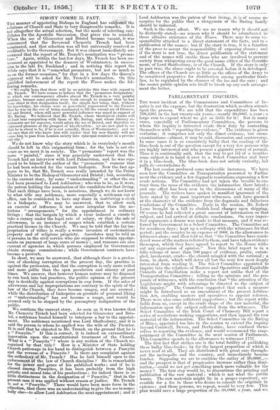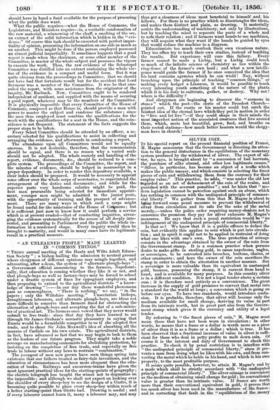PARLIAMENTARY INQUIRIES.
THE worst incident of the Commissions and Committees of In- quiry is not the expense, but the frustration which so often attends upon the process. We are told that the expenditure has been 768,4381. in the last twenty-six years,—nearly 30,0001. a year ; large sum to expend where we get so little for it': But in many cases, especially of Parliamentary Committees, the persons to whom the inquiry is intrusted evade their duty by contenting themselves with reporting the evidence." The evidence is given verbatim ; it comprises not only the direct evidence, but cross- examinations—almost, it may be said, discussion and controversy. In some cases it is so excessively bulky that the reading of the blue-book is out of the question except for a very few persons who are highly interested and who possess a gigantic power of perusal. Thus it is continually said, that the way to get rid of a. trouble- some subject is to hand it over to a. Select Committee and bury it in a blue-book. The blue-book does not satisfy curiosity, but palls it—overwhelms it. The last session produced some noticeable instances. We have seen how the Committee on Transportation presented to Parlia- ment the evidence and a few dogmatic resolutions expressing a few crude notions. The Committee had not taken the trouble to ex- tract from the mass of the evidence the information there latent ; and one effect has been seen in the discussions of many of the journals. The writers have spoken in manifest ignorance of the facts stated by the most important witnesses, and have guessed at the character of the evidence from the dogmatic and fallacious resolutions of the Committee. Early in the session, Mr. Robert Lowe brought in a bill to abolish local charges upon shipping. Of course he had collected a great amount of information on that subject, and had arrived at definite conclusions. On very imper- fect arguments a demur was made to that measure, and it was re- ferred by Government to a Select Committee. The Committee sat for seventeen days ; kept up a colloquy with the witnesses for that period ; put the country to an expense of 3001. in the allowances to witnesses alone; and then told us that "the Committee have consi- dered some of the matters referred to them, and have taken evidence thereupon, which they have agreed to report to the House with- out any expression of opinion." Now this brief report is in a folio volume Of more than 700 pages of evidence, prolix, entan- gled, incoherent, crude—the absurd mingled with the rational ; a form, in short, which will deter all but the very few most deeply interested from reading it. The Select Committee appointed to inquire into the relations of Masters and Operatives and Equitable Councils of Conciliation make a report not unlike that of the Transportation Committee ; telling us the opinions and the pro- posals of witnesses, with the conclusion that "the attention of the Legislature might with advantage be directed to the subject of this inquiry." The Committee suggested that such a measure might be introduced as an amendment of the present Arbitra- tion Act, enabling masters and operatives to appoint referees. There were also some collateral suggestions ; but the report with- holds from us, except in the crude shape of the raw material, the information upon the subject collected from the witnesses. The Select Committee of the Irish Court of Chancery Bill report a series of resolutions making suggestions, and then append the raw material of the information. The Select Committee on the Rating of Mines, appointed too late in the session to extend the inquiry beyond Cornwall, Devon, and Derbyshire, have confined them- selves to reportino.° the evidence, and would recommend the reap- pointment of the Committee in the next session of Parliament. This Committee spends in the allowances to witnesses 1771.
The first fact that strikes one is the total futility of publishing these bulky blue-books ; by far the largest proportion of which is never read at all. They are distributed with great care through- out the metropolis and the country, and immediately become lumber. Supposing we are to continue the outlay of 30,0001.,— and the prospect is that of progressive increase rather than dimi- nution,—could we not get something much more valuable for the money ? The first step would be, to discontinue the printing and publication of the raw material; which is not what the public wants. The raw materials might lie in a proper repository, ac- cessible for a fee to those who desire to consult the originals in extenso ; and those persons, we repeat, would be very few. This plan would save a large proportion of the 30,000/. a year, and we should have in hand a fund available for the purpose of procuring what the public does want. What the public requires—what the House of Commons, the Legislature, and Ministers require—is, a veritable condensation of the raw material, a winnowing of the chaff, a smelting of the ore, an extract of the solid information which is hidden in the "evi- dence." Of course this task should be executed with perfect impar- tiality of opinion, presenting the information on one side as much as on another. This might be done if the person employed possessed an almost judicial impartiality. It sometimes happens that a good report is made when the chairman, or some other member of the Committee, is master of the whole subject and possesses the vigour to execute the work. Thus, the raw evidence of the Sebastopol Committee was distilled into an extract containing the whole vir- tue of the evidence in a compact and useful form. But it was quite obvious from the proceedings in Committee, that we should not have had that fortunate result but for the accident that Lord Seymour was a member of the Committee. It was he that exe- cuted the report, with some assistance from the originator of the inquiry, Mr. Roebuck. Now, Committees ought to be rendered independent of accident, and supplied with the means of securing a good report, whatever may be the members of the Committee. It is physically impossible that every Committee of the House of Commons, composed as that House is, should provide a man with power to master the subject and condense the substance ; since the men thus employed must combine the qualifications for the
work with the qualifications for a seat in the qualifications
and the coin- cidence is not frequent. The statement of the facts suggests the proper steps to be taken. Every Select Committee should be attended by an officer, a se-
cretary. selected for his qualifications to assist in collecting and
arranging the evidence, and afterwards in condensing a report. The attendance upon all Committees would not be equally onerous. It is not desirable, therefore, that the remuneration should be equal, and there is no reason why a varied scale should not be adopted. The whole custody and handling of the report, evidence, documents, &c., should be reduced to a com- plete system. The proceedings of the Committee, the report; and
the minutes of evidence should be lodged in manuscript in a
proper depesitory. In order to render this depository available, a clear index should be prepared. It would be necessary to appoint some officer over the whole corps of secretaries, to superintend the
arrangement of the duties and documents; and while for the superior posts very handsome salaries might be paid, the best man procurable being selected for immediate appoint- ment, younger men might be admitted to the junior posts, with the opportunity of training. and the prospect of advance- ment. There are many ways in which such a corps might be found useful for the' assistance of the House of Consmons ; but it is sufficient just now to know how it could perforffi a service which is at present evaded—that of conducting inquiries, arran- ging the evidence systematically for the access of 01 deeply inte- rested, and presenting to Parliament and the public the whole in- formation in a condensed shape. Every inquiry would then be brought to maturity, and would in many cases have its legitimate result in a practical measure.



























 Previous page
Previous page